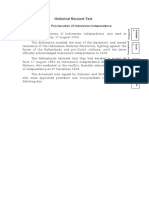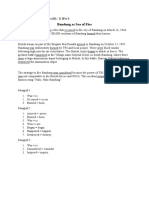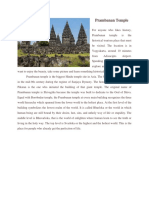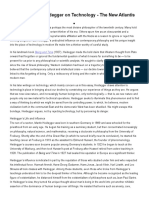30 September Movement (Recount Text Milik Yazaka)
30 September Movement (Recount Text Milik Yazaka)
Uploaded by
Muhammad Yazaka Julianto HaqqiCopyright:
Available Formats
30 September Movement (Recount Text Milik Yazaka)
30 September Movement (Recount Text Milik Yazaka)
Uploaded by
Muhammad Yazaka Julianto HaqqiOriginal Title
Copyright
Available Formats
Share this document
Did you find this document useful?
Is this content inappropriate?
Copyright:
Available Formats
30 September Movement (Recount Text Milik Yazaka)
30 September Movement (Recount Text Milik Yazaka)
Uploaded by
Muhammad Yazaka Julianto HaqqiCopyright:
Available Formats
30 September movement/Indonesian communist party
(G30S/PKI)
September 30th Movement, group of Indonesian
military personnel who captured and murdered six generals in
1965, marking the commencement of the abortive coup that
led to the fall from power of Sukarno, Indonesia's first
president. Late in the evening on Sept. 30, 1965, a group of
army conspirators calling itself the September 30th Movement
gathered in Jakarta with the aim of kidnapping and killing
seven army generals in the early hours of the following
morning.
The Indonesian Communist Party (Partai Komunis
Indonesia; PKI) maintained that the coup attempt was an internal affair of the army. The army leadership, on
the contrary, insisted that it was part of a PKI plot to seize power and subsequently embarked on a mission to
purge the country of the perceived communist threat. In the following month the military slaughtered
communists and alleged communists across Java and in Bali; estimates of the number of people killed
ranged from 80,000 to more than 1,000,000. In the following years communists, alleged communists, and
their families were frequently denied basic rights (e.g., the right to a fair trial, the right to equal opportunity
in employment, and freedom from discrimination). Between 1969 and 1980, approximately 10,000 persons,
primarily known or purported communists, were detained without trial on the island of Buru in the
Moluccas.
With the destruction of the PKI, one of the
elements of balance that had supported the Sukarno
regime was eliminated, and the president himself
came under increasing pressure. In March 1966,
against a background of student action, the army
forced Sukarno to delegate extensive powers to
Suharto, now chief of staff of the army. With his new
authority, Suharto banned the PKI and moved gradually to consolidate his position as the effective head of
government. In March 1967 the Indonesian legislature installed Suharto as acting president, and in March
1968 he was appointed to the presidency in his own right. Sukarno was kept under house arrest until his
death on June 21, 1970.
The years between 1965 and 1968 were among
the most tumultuous and violent in Indonesia's history,
and this period has served as the backdrop for a
number of widely acclaimed works of literature and
film.
< Name : MUHAMMAD YAZAKA JULIANTO HAQQI | Class : X – 9 >
You might also like
- Wonderful Trip To JogjaDocument3 pagesWonderful Trip To Jogja052Salsabilla Putri NurimaniNo ratings yet
- Descriptive TextDocument5 pagesDescriptive TextIing DoangNo ratings yet
- Historical Recount TextDocument1 pageHistorical Recount TextkamaluddinNo ratings yet
- Hortatory Exposition 12Document8 pagesHortatory Exposition 12Hwayugi KerenNo ratings yet
- Chapter 1-Bhs. Inggris Kelas VIIDocument26 pagesChapter 1-Bhs. Inggris Kelas VIIdamianusNo ratings yet
- Worksheet 1 Chapter VII Kelas 8Document1 pageWorksheet 1 Chapter VII Kelas 8Zuhdi Syarif0% (1)
- Descriptive TextDocument2 pagesDescriptive TextKhoirunnisa MuslimawatiNo ratings yet
- Lembar Kerja Peserta Didik Lilis SuryaniDocument5 pagesLembar Kerja Peserta Didik Lilis Suryanililis suryaniNo ratings yet
- Materi Dan Soal Bahasa Inggris Expressing OpinionDocument3 pagesMateri Dan Soal Bahasa Inggris Expressing OpinionPebri PermanaNo ratings yet
- Soal Descriptive TextDocument1 pageSoal Descriptive TextWejang AlvinNo ratings yet
- Discussion Text 2 SoalDocument2 pagesDiscussion Text 2 SoalPak IndarNo ratings yet
- Soal Bahasa Inggris Kelas 11 Lanjutan Ganjil RuthDocument4 pagesSoal Bahasa Inggris Kelas 11 Lanjutan Ganjil RuthDeni JambiNo ratings yet
- Descriptive TextsDocument20 pagesDescriptive Textsadraini daffindoNo ratings yet
- Students Worksheet (Narrative Text)Document2 pagesStudents Worksheet (Narrative Text)nur sodiqNo ratings yet
- Bahan Ajar Reading Short StoryDocument3 pagesBahan Ajar Reading Short StoryBilly OktavioNo ratings yet
- Laskar Pelanggi B.inggrisDocument10 pagesLaskar Pelanggi B.inggrisPutri MayangsariNo ratings yet
- Materi SongDocument17 pagesMateri SongYerni Hida SiagianNo ratings yet
- Bahasa Inggris Wajib BiografiDocument1 pageBahasa Inggris Wajib BiografiVania AurelliaNo ratings yet
- Sura & BayaDocument1 pageSura & Bayadimas setyawanNo ratings yet
- Contoh Recount Text Beserta Soal Dan 21.HTMLDocument3 pagesContoh Recount Text Beserta Soal Dan 21.HTMLSiti Rahmawati67% (3)
- Expressing IntentionDocument5 pagesExpressing IntentionSiti EvayantiNo ratings yet
- Bandung Lautan APIDocument3 pagesBandung Lautan APIEva SalsabilaNo ratings yet
- Pathway To English SMA XI Wajib Chapter 1Document9 pagesPathway To English SMA XI Wajib Chapter 1Aisyah Oktaviani0% (1)
- ENGLISH TASK LoveDocument3 pagesENGLISH TASK LoveNi Komang Yati NingrumNo ratings yet
- Happiness and SympathyDocument10 pagesHappiness and SympathyAZHAR OFFICIALNo ratings yet
- ENRICHMENT Narrative Text Bahasa InggrisDocument11 pagesENRICHMENT Narrative Text Bahasa Inggriswe R happy familyNo ratings yet
- Dialog Layonsari and JayapranDocument5 pagesDialog Layonsari and JayapranmonasNo ratings yet
- PandaDocument3 pagesPandaSyifaul Qalbi0% (1)
- Could The Us Regulate What Americans EatDocument3 pagesCould The Us Regulate What Americans EatMoh Asfar SeptiadiNo ratings yet
- Hortatory Exposition TextsDocument2 pagesHortatory Exposition TextsNasywa Arrahma KurniawanNo ratings yet
- Kumpulan Contoh Text SpoofDocument85 pagesKumpulan Contoh Text SpoofAriev OneheartNo ratings yet
- TEACHING Speaking (Full Materi)Document4 pagesTEACHING Speaking (Full Materi)Anonymous OFANYRz3ZNo ratings yet
- Soal Latihan Asking and Giving Fact For StudentDocument1 pageSoal Latihan Asking and Giving Fact For StudentAan Mi'dadNo ratings yet
- Bahan Ajar ReadyDocument11 pagesBahan Ajar ReadyzainabNo ratings yet
- LKPD Fairy TaleDocument4 pagesLKPD Fairy Tale018-Diska LathifahNo ratings yet
- Anecdote Text and ExcerciseDocument4 pagesAnecdote Text and ExcercisezulhulaefahNo ratings yet
- Soal Drill Worksheet Chapter III Kelas XSMADocument5 pagesSoal Drill Worksheet Chapter III Kelas XSMANana Mutmainnah100% (1)
- HENGKYDocument4 pagesHENGKYRahmat HalawaNo ratings yet
- Vacation in JogjakartaDocument2 pagesVacation in JogjakartaKarisma PiawayNo ratings yet
- Narrative Text (Snow White)Document9 pagesNarrative Text (Snow White)irmansyahNo ratings yet
- ConditionalDocument6 pagesConditionalnoviNo ratings yet
- Materi PBM Kelas 9 Expressing of Giving AdviceDocument2 pagesMateri PBM Kelas 9 Expressing of Giving AdviceSamuel SilalahiNo ratings yet
- Exercise of Narrative TextDocument3 pagesExercise of Narrative TextAgustina Indah BahariNo ratings yet
- Contoh Soal Hots AnnouncementDocument1 pageContoh Soal Hots AnnouncementProbo SuciptoNo ratings yet
- English (Historical Recount Text)Document1 pageEnglish (Historical Recount Text)Nasywa ZhrsNo ratings yet
- Teks Recount LiburanDocument12 pagesTeks Recount LiburanIfan SupriyatnoNo ratings yet
- Contoh Narrative TextDocument2 pagesContoh Narrative Textaidon siskandarNo ratings yet
- Passive VoiceDocument12 pagesPassive VoiceHanni AprilianiNo ratings yet
- Descriptive Text KD 3.3Document17 pagesDescriptive Text KD 3.3Ifani RamadhaniNo ratings yet
- Text NarativeDocument7 pagesText Narative23.Muhammad AbyanNo ratings yet
- Soal AnnouncementDocument9 pagesSoal AnnouncementNinaralin HeryaniNo ratings yet
- Soal Inggris XDocument9 pagesSoal Inggris XayuherdinyNo ratings yet
- Makalah Binggi UttiDocument37 pagesMakalah Binggi UttiMifta AnnisaNo ratings yet
- Prambanan Temple - Descriptive TextDocument1 pagePrambanan Temple - Descriptive TextOceee100% (1)
- The Fool and The DonkeyDocument2 pagesThe Fool and The DonkeyMuhammad Hadi Nurrofiq100% (1)
- Contoh Imaginative Recount Text Pendek Beserta ArtinyaDocument2 pagesContoh Imaginative Recount Text Pendek Beserta ArtinyaUPTD puskesmas bantarujegNo ratings yet
- Bahasa Inggris Tingkat Lanjut Untuk SMA Kelas 11SISWA Halaman 86 131Document46 pagesBahasa Inggris Tingkat Lanjut Untuk SMA Kelas 11SISWA Halaman 86 131anis ellalfarNo ratings yet
- Amara Putri Syarfa - 04 - X MIPA 4 - Tugas 3.7.2Document2 pagesAmara Putri Syarfa - 04 - X MIPA 4 - Tugas 3.7.2Amara PutriNo ratings yet
- A Brief History of The Real G30S PKIDocument5 pagesA Brief History of The Real G30S PKISyakura Failasifa100% (1)
- FAQ SINAMICS G Firmwarestnde V4.7 SP10 HF5Document4 pagesFAQ SINAMICS G Firmwarestnde V4.7 SP10 HF5miltonNo ratings yet
- Mani 003 B8Document21 pagesMani 003 B8SANJAY KUMARNo ratings yet
- EDN612 ESN212 EPN210 Installation GuideDocument28 pagesEDN612 ESN212 EPN210 Installation GuideOnofreNo ratings yet
- SIM335 Managing Projects: Faculty of Business and LawDocument8 pagesSIM335 Managing Projects: Faculty of Business and LawtechnicalvijayNo ratings yet
- Chapter 12 (Saunders)Document13 pagesChapter 12 (Saunders)sdgdfs sdfsfNo ratings yet
- Vanilla Sfe Extract Safety Data Sheet: 1. IdentificationDocument8 pagesVanilla Sfe Extract Safety Data Sheet: 1. Identificationfransisco30No ratings yet
- How To See Dna With Naked EyeDocument13 pagesHow To See Dna With Naked EyeShabnam Muhammed Sholay50% (2)
- Encyclopedia of Reconstruction EraDocument933 pagesEncyclopedia of Reconstruction EraEgziabher Bin JoAnn100% (2)
- V1 Excon 2022 Machine List 18.12.2022Document19 pagesV1 Excon 2022 Machine List 18.12.2022Abhinav DeepNo ratings yet
- "When I Use A Word," Humpty Dumpty Said, in Rather A Scornful Tone, "It Means Just What I Choose It To Mean-Neither More Nor Less."Document4 pages"When I Use A Word," Humpty Dumpty Said, in Rather A Scornful Tone, "It Means Just What I Choose It To Mean-Neither More Nor Less."jessicaNo ratings yet
- Đề Số 35 Có Giải Chi TiếtDocument18 pagesĐề Số 35 Có Giải Chi Tiếtdungvu210390No ratings yet
- ExperimentsDocument50 pagesExperimentsOmed. HNo ratings yet
- SQ505638 - Aayan Al Nokhba-MVE Spare Parts-Rev-00Document10 pagesSQ505638 - Aayan Al Nokhba-MVE Spare Parts-Rev-00mostafa husseinNo ratings yet
- Understanding Heidegger On Technology The New Atlantis: Being and TimeDocument13 pagesUnderstanding Heidegger On Technology The New Atlantis: Being and TimeIsolda GalvaNo ratings yet
- RN518 MWDocument54 pagesRN518 MWDominiqueNo ratings yet
- Crumbl'd Xmas 2022Document10 pagesCrumbl'd Xmas 2022Lia shopNo ratings yet
- Lesson 1. NEW FRIENDSDocument6 pagesLesson 1. NEW FRIENDSLUZ AURORA ZUNICO TELLONo ratings yet
- ENT530 SOCIAL MEDIA REPORT Pages 1-25 - Flip PDF Download - FlipHTML5Document25 pagesENT530 SOCIAL MEDIA REPORT Pages 1-25 - Flip PDF Download - FlipHTML5farahhana nazrieNo ratings yet
- Bengal General Clauses Act, 1899 PDFDocument18 pagesBengal General Clauses Act, 1899 PDFLatest Laws TeamNo ratings yet
- 2018 Nissan Kicks enDocument8 pages2018 Nissan Kicks ennovkovic1984No ratings yet
- SST Art Integrated ProjectDocument13 pagesSST Art Integrated ProjectANo ratings yet
- Backup of GP BOOKLET FINALBLUElastDocument28 pagesBackup of GP BOOKLET FINALBLUElastPrabhakar KumarNo ratings yet
- Differences of Dispersion, Scattering, InterfereDocument19 pagesDifferences of Dispersion, Scattering, InterfereShelvie Morata (Bebeng)No ratings yet
- WalkDocument7 pagesWalkTanuNo ratings yet
- Admit Card2023Document2 pagesAdmit Card2023Anikate SharmaNo ratings yet
- Painting 15mm German TutorialDocument3 pagesPainting 15mm German Tutorialapi-117718285No ratings yet
- Maharashtra Organic Farming Association of India - CompressDocument79 pagesMaharashtra Organic Farming Association of India - CompressKeshav SpiceworldNo ratings yet
- Udl Unit PlanDocument5 pagesUdl Unit Planapi-507696269No ratings yet
- 2023-02-16 St. Mary's County TimesDocument32 pages2023-02-16 St. Mary's County TimesSouthern Maryland OnlineNo ratings yet
- Occupied House Property: Computation of Income From A SelfDocument34 pagesOccupied House Property: Computation of Income From A SelfVarun SinghviNo ratings yet

























































































